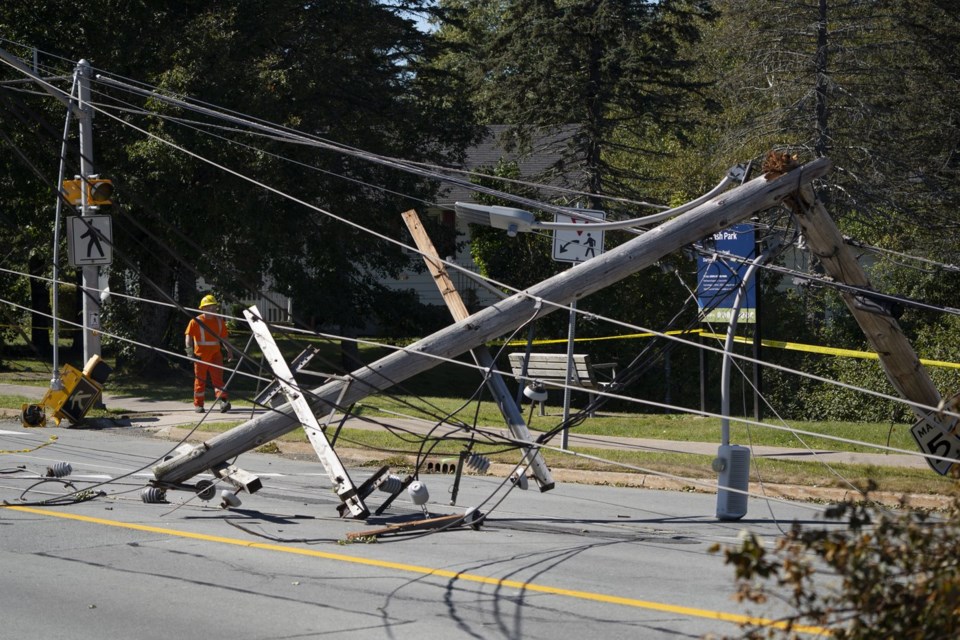HALIFAX — Nova Scotia Power is being fined for the third time in four years for failing to meet annual performance targets for the reliability of its energy grid.
The province's energy regulator says in the decision released Monday it is levying a $1.25-million penalty on the subsidiary of Halifax-based Emera Inc. for shortfalls in 2023.
The latest fine against the private company is the largest to date, after the Utility and Review Board imposed penalties of $750,000 for failing to meet the standards in 2022, $375,000 in 2021 and $250,000 in 2019. There was no financial sanction for 2020.
It is not acceptable that the failures to meet performance standards "has become a normal occurrence" for the utility, the review board said.
Nova Scotia Power failed in 2023 to meet two reliability targets for outage frequencies and duration, and four of five elements in the standards for new service connection times.
Under the standards, the average power outage should not last more than about 4.3 hours, but in 2023 it was 5.2 hours. Meanwhile, the average number of outages per customer should not have exceeded two, but that year it was about 2.2. These figures don't include outages by extreme weather, such as hurricanes.
"It is the board’s view that progress in addressing reliability issues … has been lagging. More needs to be done and with greater urgency," the decision said.
The board acknowledged the private utility is spending $45 million annually to trim and cut down trees, and that the company is installing stronger poles and gear. Expected reliability improvements, however, haven't been realized despite those efforts, it said.
"Targets have not been met for three consecutive years, certain customer service targets have not been met for two consecutive years," the report says.
The company said in an emailed statement that is has increased spending on reliability from $180 million annually to $230 million.
However, the regulator said Nova Scotia Power needs to show how the money invested is strengthening the grid, and the review board has ordered it to create a five-year reliability plan by Dec. 31. It says the plan should explain where money is going and measure how much improvement to reliability will occur as a result.
The review board said it doesn't accept the utility's position during hearings that a fine would "only serve to adversely impact Nova Scotia Power's already challenging financial position." Rather, the board says the requirement that the power company produce a plan and pay a penalty is needed to promote future compliance.
In 2023, Nova Scotia Power's parent company reported $289 million in net income.
Nova Scotia Power is not allowed to recover the cost of the penalty by increasing power rates. Instead, the $1.25 million is credited to customers to help reduce power bills.
According to the board, just over 11 per cent of customers experienced five or more sustained outages in 2023 — excluding outages from major storms — which is higher than the 2017 level of 6.4 per cent and more than the five-year average of about 10 per cent.
Peter Gregg, chief executive of Nova Scotia Power, said in an emailed statement that "we recognize we need to do better, not only in meeting our performance standards, but in our relentless focus on reliable, affordable power for Nova Scotians."
The company also said it is hiring "dozens of new planner positions and wiring inspectors" and will increase the number of power line technicians in the company from 175 to 195 positions.
This is the first year the board was permitted to impose a fine greater than $1 million. In 2022, the Progressive Conservative government introduced a bill to increase the maximum fine to $25 million, but that legislation did not become law until April 2023.
At the time, provincial Natural Resources Minister Tory Rushton said the province wanted to hold the private utility more accountable for power outages and performance issues.
This report by The Canadian Press was first published Sept. 9, 2024.
Michael Tutton, The Canadian Press

